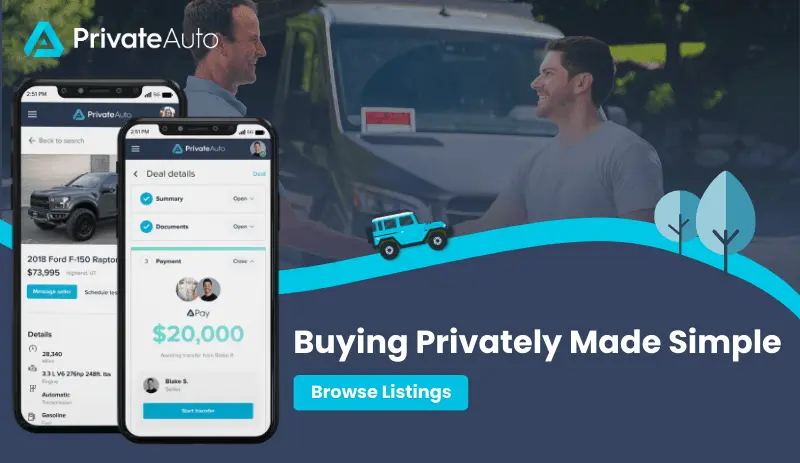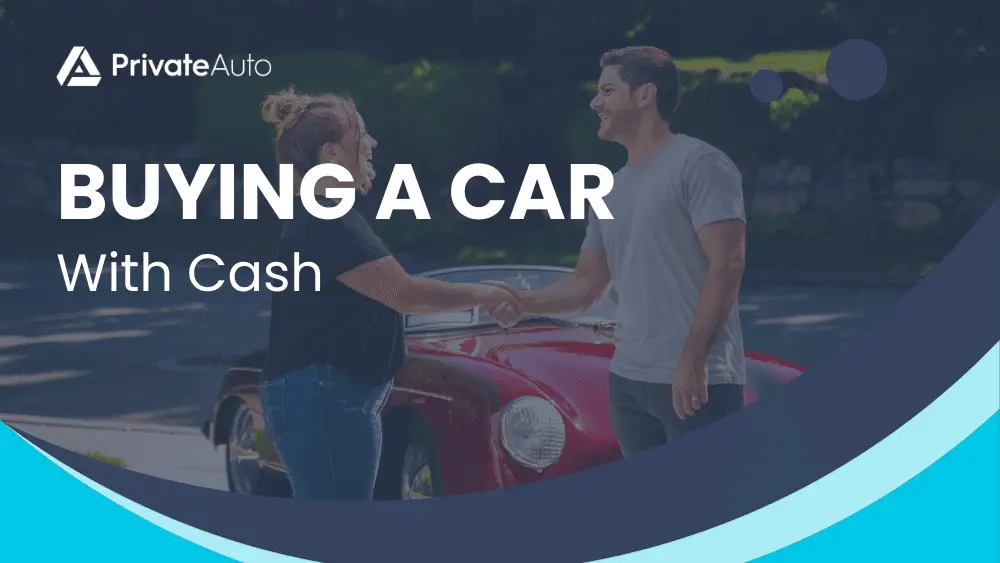What does it mean to pay cash?
What Does it Mean to Pay Cash?
The terms “cash payment” or “paying in cash” can have two different meanings:
1. Paying for a car with money you have, as opposed to taking out a loan. The money doesn’t necessarily have to be in paper form, as in a giant wad of hundred-dollar bills. In this sense of “paying in cash,” a check or bank wire would also qualify.
2. Paying with physical currency—bills printed by the US Treasury as legal tender—as opposed to check, credit card, or other payment method.
Advantages of physical cash
What are the Advantages of Physical Cash?
Here are the top reasons physical cash has been a go-to payment method when buying a private-party car:
1. Immediacy: cash provides instant settlement. Once the bills trade hands, the deal is done. There’s no waiting for checks to clear or wire transfers to be processed.
2. Security features: modern currency contains advanced anti-counterfeiting measures, from watermarks to color-shifting ink.
3. No paper trail: cash transactions offer privacy, since there is no bank record. For those who prefer to keep their finances under the radar, paper money provides anonymity.
4. Universal acceptance: cash in hand is universally accepted at face value. You never have to wonder if the other party will accept bills as payment. Cash plays anywhere, anytime.
5. Psychological appeal: physically exchanging paper money can provide psychological reassurance between strangers.
Disadvantages of physical cash
What are the Disadvantages of Physical Cash?
Cash may seem like the most straightforward way to pay for a used car, but physical cash has the following drawbacks:
1. Safety risks. Carrying large amounts of cash is dangerous and can make you a target for robbery or theft. This goes for both buyers and sellers. It’s unsafe to meet with strangers while carrying thousands of dollars in cash. The other party could potentially be setting up a scam or robbery.
2. No recourse. With cash, there is no paper trail or proof of payment. If a dispute arises, you have no proof that you paid for the car.
3. Inconvenient. Withdrawing and transporting large cash sums is a major hassle. Banks will not hand over tens of thousands of dollars in cash at once. Also, counting and verifying a large stack of bills takes time.
4. Money laundering concerns. Large cash deals can raise red flags and get you scrutinized.
5. Counterfeit risk. Sellers may suspect fake bills and need to meticulously verify authenticity.
6. Tax implications. Private cash purchases make audit trails harder for the IRS, which expects documentation.
If you like paying cash, but you’re tired of the inconvenience of physical cash, we’ve got something you’re going to love…
A better way to pay cash
A Better Way to Pay Cash for Cars
PrivateAuto Pay is like Venmo with no transaction limits. It’s the ultimate way to pay cash for your next car.
- We literally integrated an FDIC-insured banking solution into the PrivateAuto platform.
- Payments process instantly, any time of day, every day of the year. You send the money, the seller gets the money—right now.
- Send $50K, $80K, or a million dollars (or more).
- No transfer fees: PrivateAuto Pay is free for PrivateAuto users
It’s ridiculous that someone hasn’t come up with this before. But better late than never. You’ll never want to pay for a car any other way.
How to buy a car with physical cash
How to Buy a Car With Physical Cash
If you’re going to buy a car with actual bills, you’re in for a bit of a hassle. Here’s the process.
1. Go to your bank and withdraw large amounts of cash. Answer weird questions about why you need so much cash. Depending on your bank’s withdrawal limits, potentially repeat this step multiple times until you have enough.
2. Keep all that cash safe and secure. Feel paranoid (and rightly so) having that much cash with you. Tote it with you to the meetup, praying the seller is a decent human being.
3. Give over the cash and hope the seller doesn’t run off with it and the car, leaving you in the lurch. Watch in uncomfortable silence as the seller counts the bills to verify the amount.
4. Finally, the seller finishes counting the bills and signs over the title to you. Deal done.
Or…skip all that and use PrivateAuto Pay.
Steps to pay with PrivateAuto Pay
How Do I Buy a Car With PrivateAuto Pay?
With PrivateAuto Pay, paying cash is a whole lot easier:
1. Fund your PrivateAuto Pay account in advance of the transaction. Don’t worry: you can easily move money back to your external bank account if you don’t use it all.
2. Meet up for the test drive (easy to schedule in the PrivateAuto app).
3. You and the seller each sign an official bill of sale, in your PrivateAuto mobile app.
4. Once you receive notification that the seller has signed the bill of sale, you’ll be prompted to release payment. PrivateAuto Pay will instantly transfer your money to the seller’s PrivateAuto Pay account and they will see confirmation.
5. The seller transfers the title to you and gives you the keys.
It’s almost too easy.
Is paying with a check better?
Is Paying With a Check Better Than Paying in Cash?
A cashier’s check isn’t much of an improvement over physical cash. It’s inconvenient (you have to go to your bank to get it), it costs money, and it’s not foolproof. Criminals have forged counterfeit cashier’s checks to con sellers, so a savvy seller may insist on meeting at your bank for verification of legitimacy.
Skip the cost, inconvenience, and limited banker’s hours. PrivateAuto Pay transfers are free, instant, and available 24/7/365.
What If I can’t afford to pay cash?
What If I Can’t Afford to Pay Cash?
If you don’t have the money saved up to buy a car outright, you’re not alone. Plenty of Americans finance their vehicle purchase.
PrivateAuto has integrated USALLIANCE, an FDIC-insured lender, to make vehicle financing easy. You can apply for a competitive vehicle loan, get funded, and close the deal in one seamless interface.
The entire process happens smoothly within the PrivateAuto app. After a credit score check, you can get approved in minutes for competitive used auto loan rates. The lender then deposits the funds into your PrivateAuto Pay account.
You’ll send payment to the seller from your funded PrivateAuto Pay account. The seller receives the funds instantly, the same as if you were sending your own money. No coordination with the lender required.
There’s no waiting on checks or loan paperwork. You’ll make payments to the lender afterwards like any other car loan.
Tax implications of buying a car in cash
What are the Tax Implications of Buying a Car in Cash?
Unless you live in a state without sales tax, you’ll need to pay sales tax on your vehicle purchase. Other than that, there aren’t a lot of tax implications when buying a car—whether you pay cash or get a car loan.
Here’s what you need to know about tax implications for vehicle purchases in a general sense. Always do your research on your state’s requirements, as they may vary.
- No income tax. A car purchase is not taxable income, so no income taxes are owed.
- No gift taxes. Even gifting the car to someone later does not generally incur gift taxes unless it’s a very expensive car. Individual state rules may differ
- Sales tax. You will owe applicable state sales tax on the purchase price. The rate varies by state but averages 4% to 7% of the car’s value.
- Private sellers don’t collect tax. You will pay sales tax to your local DMV (or equivalent agency for your state) when you register the car.
- Sales tax exemptions. If you’ve purchased the car from an immediate family member, or if you represent a religious organization or governmental agency, you may qualify for a sales tax exemption. Each state defines its own rules for tax exemptions, so do your research to see if you qualify.

FAQ on Buying a Car With Cash
What do you do after you buy a car from a private seller?
Buying a car from a private seller rather than a dealership requires a few extra steps to make sure you can legally drive and register the car.
Key steps after buying a car privately are registering the vehicle, transferring the title, and getting new license plates issued in your name (unless you’re in California or Minnesota).
Here are some more details on handling those specific post-purchase tasks:
– When you purchase the car, the seller should provide you with a signed Certificate of Title. Review it to make sure every applicable field is filled out, that all info is accurate, and that the seller has signed.
– Before driving off, contact your insurance company to add the car to your policy. You typically need valid insurance in your name to drive legally. Make sure you have proof of car insurance.
– Head to the DMV as soon as possible to transfer the title to your name and register the car. Bring the title, bill of sale, ID, and insurance documents. Pay any required sales taxes and registration fees.
– The DMV will provide you with new registration documents and license plates for the car in your name. These are required to legally drive the car.
– All states except California and Minnesota: install your license plates.
– Consider having the car inspected for safety and emissions testing, if required in your state. The DMV can provide guidance.
– Notify your insurance company that the car is now registered in your name. Provide them with the new VIN, plates, and registration.
Buying a car is sort of like starting a relationship. You’ll be spending a lot of time together. Start things off right by handling all the details associated with buying a car from a private seller.
What paperwork is needed to buy a car from a private seller?
After you buy a car from a private seller, you’ll need to go to the DMV (or equivalent agency for your state) and finalize the purchase. The DMV will require specific things from you. Different states have different paperwork requirements, but here are some common things you should provide:
– Bill of sale
– Vehicle title
– Registration
– Odometer statement
– Proof of auto insurance
– State ID
– Inspection forms
Do I need an escrow service when buying a car privately?
If you’ve found a good used vehicle and are ready to buy it, a legitimate escrow service can help solve the problem of trust between strangers. Unfortunately, escrow services are expensive and time-consuming.
PrivateAuto gives you escrow-like safeguards in the palm of your hand. Where escrow services charge fees and require time-consuming coordination, PrivateAuto Pay enables instant, fee-free payments.
Read how PrivateAuto Pay enables remote vehicle transactions to learn more about how it can replace escrow.
Does PrivateAuto offer payment plans?
PrivateAuto is a transactional marketplace that connects you directly with private sellers. You do not pay us for your car; you pay the seller. We do offer in-app financing options via a third party lending partner. You can apply for financing within our app. If approved, the lender pays the seller in full while you make your monthly car payment to the party lender according to the terms of your auto loan.
Does PrivateAuto provide the necessary paperwork for a successful transfer of ownership?
PrivateAuto has all the paperwork you need to buy a car in any state. Each state requires different paperwork to legally transfer titles and buy vehicles from a private party. Many states require a bill of sale. Some states have their own specific forms that are required to buy or sell a vehicle in the state.
PrivateAuto manages all these forms and makes them available for both buyers and sellers to electronically sign. The entire process is only accessible by the buyer and seller, which reduces the risk of identity theft. It can be difficult to keep up with state-specific laws, particularly if you’ve moved states recently, so use PrivateAuto to ensure a smooth and legal transaction.
Further Reading

Caleb Whittle
Contributing Author
Caleb Whittle is the Chief Marketing Officer at PrivateAuto. He’s based in Utah and has had a passion for education and learning throughout his life. Helping others understand the nuances of buying & selling cars has become his mission through content creation and writing. His current dream car is a Tesla Model S Plaid.
